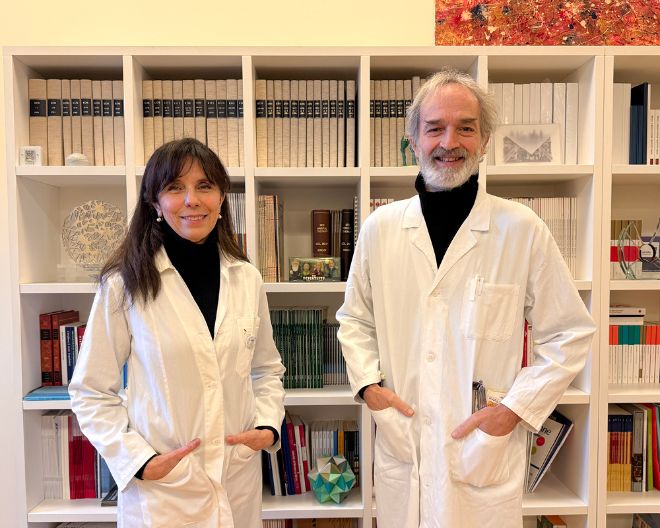Pancreatic Cancer: New Treatment Guidelines Arising from a Patient-Funded Study
0/resolutions/res-l992x10000/Cassandra_studio_pazienti_pancreas_UniSR-(1)0.png)
The phase 3, randomized, multicenter Italian CASSANDRA study—recently presented at the Annual Meeting of the American Society of Clinical Oncology (ASCO) in Chicago—was entirely funded by patient associations. The study involved 17 hospitals across Italy and focused on preoperative treatment for patients with non-metastatic pancreatic cancer, showing improved outcomes compared to the current standard of care.
Professor Michele Reni, Head of the Oncology and Oncology Day Hospital Units, Director of the Strategic Clinical Coordination Program of the Pancreas Center at IRCCS San Raffaele Hospital, and Associate Professor of Oncology at Vita-Salute San Raffaele University, conceived and coordinated the study. He presented the results of the CASSANDRA Project at ASCO, the world’s most important oncology congress.
The study aimed to improve treatment outcomes in patients eligible for surgical removal of pancreatic ductal adenocarcinoma (PDAC), by comparing the effectiveness of two chemotherapy regimens administered before surgery. Results showed that patients treated with PAXG—a combination developed at San Raffaele in 2012 and approved by the Italian Medicines Agency (AIFA) in 2020 for metastatic or advanced pancreatic cancer—had significantly longer event-free survival compared to those treated with mFOLFIRINOX, the current standard regimen.
Pancreatic Ductal Adenocarcinoma (PDAC)
PDAC is the most common malignant pancreatic tumor, accounting for 95% of all pancreatic cancers. It represents around 3% of all new cancer cases each year, is the third leading cause of cancer-related deaths, and has the lowest five-year survival rate among solid tumors. Originating from the exocrine cells of the pancreas, the disease spreads rapidly and is often diagnosed at an advanced stage. Only 10–20% of patients are eligible for surgery at diagnosis. However, over 90% of patients with seemingly localized disease already have undetectable microscopic metastases. This underlines the importance of perioperative chemotherapy, which increases the chances of cure and prolongs survival more effectively than postoperative chemotherapy—often hindered by slow and difficult recovery after major surgery.
/resolutions/res-l1920x10000/Mortini_cono_midollare_UniSR-(1).png)
The CASSANDRA Project
"The CASSANDRA study was designed to improve prognosis without compromising quality of life,"
says Professor Reni. The study compared PAXG and mFOLFIRINOX regimens administered for 4 to 6 months before surgery.
The trial, coordinated by IRCCS San Raffaele Hospital, enrolled 260 patients across 17 hospitals: 132 received PAXG, while 128 were treated with mFOLFIRINOX.
The results showed that event-free survival (defined as freedom from disease progression, recurrence, inoperability, rising tumor markers, metastasis discovered during surgery, or death) was significantly longer in the PAXG group.
“This marks a historic milestone in the fight against pancreatic cancer,” says Professor Reni. “The difference observed is striking, especially compared to what has long been considered the most effective regimen for this disease. Moreover, patients treated with PAXG showed significantly improved pathological responses—meaning less residual tumor detected in surgical specimens—better biochemical responses, and lower risk of disease progression during chemotherapy.”
“These findings underscore the importance of independent clinical research and show how innovative treatment strategies can meaningfully improve patient outcomes, potentially leading to updated guidelines for managing this challenging disease,”
adds Professor Massimo Falconi, Head of the Pancreatic Surgery Unit and Director of the Pancreas Translational & Clinical Research Center at IRCCS San Raffaele Hospital, Full Professor of Surgery at Vita-Salute San Raffaele University, and co-lead investigator of the study.
/resolutions/res-l1920x10000/Cassandra_studio_pazienti_pancreas_UniSR-(2).jpg)
The Crucial Role of Patient Associations
One of the most remarkable aspects of the CASSANDRA study is that it was fully funded by five patient advocacy groups: My Everest, Codice Viola, Associazione per la Vita, Natalucci, and Oltre la Ricerca. This highlights the crucial role that civil society and patient communities can play in advancing scientific research.
“Without their support, this study wouldn’t have been possible,” emphasized Professor Reni. “This collaboration between the scientific community and civil society demonstrates how collective efforts can lead to real progress in cancer care. We are deeply grateful to these associations for believing in our vision and enabling us to take this important step forward. Their commitment and trust were essential to pushing the boundaries in the treatment of pancreatic cancer, a disease that still poses many unanswered questions. This study proves that independent, community-backed research can truly make a difference.”
Future Perspectives: The Role of the Pancreas Center and the Comprehensive Cancer Center
ASCO’s attention to the CASSANDRA study highlights the value of Italian research and the potential global impact of this new therapeutic approach. The results open the door to updated international guidelines and the launch of new clinical trials.
Within this framework, the Pancreas Center at IRCCS San Raffaele—which enrolled nearly 50% of the study’s patients—confirms its role as a national and international reference center for pancreatic disease. The Center follows an integrated model involving experts in oncology, surgery, radiology, gastroenterology, radiation therapy, pathology, nuclear medicine, clinical nutrition, psychology, diabetology, and translational research.
The Pancreas Center is fully integrated into the San Raffaele Comprehensive Cancer Center, led by Professor Fabio Ciceri, Head of the Hematology and Bone Marrow Transplant Unit at IRCCS San Raffaele Hospital and Full Professor of Hematology at Vita-Salute San Raffaele University. The synergy between clinical excellence and shared resources aims to develop increasingly effective, personalized treatments to improve survival and quality of life for cancer patients.
“Our patients’ well-being is our primary goal. The San Raffaele Comprehensive Cancer Center was created to optimize care pathways by fostering collaboration among all our clinical and scientific centers of excellence, including the Pancreas Center,” says Professor Ciceri. “Through integration of clinical care and translational research, we provide access to innovative, experimental, and personalized therapies—supporting our patients at every stage of their journey.”
Research continues, with upcoming results expected to further refine therapeutic strategies. “Our work as a Center of Excellence for pancreatic cancer doesn’t end here,” conclude Professors Reni and Falconi. “Soon, we will release results regarding the optimal duration of preoperative chemotherapy—whether the entire 6-month course should be given before surgery, or instead divided into 4 months pre- and 2 months post-operative.”
You might be interested in

Multiple sclerosis, breakthrough in research: researchers have identified a molecule that promotes repair of the nervous system

The microbiome as an ally against myeloma

Intrecci: a UniSR project for more inclusive and accessible cancer diagnosis

